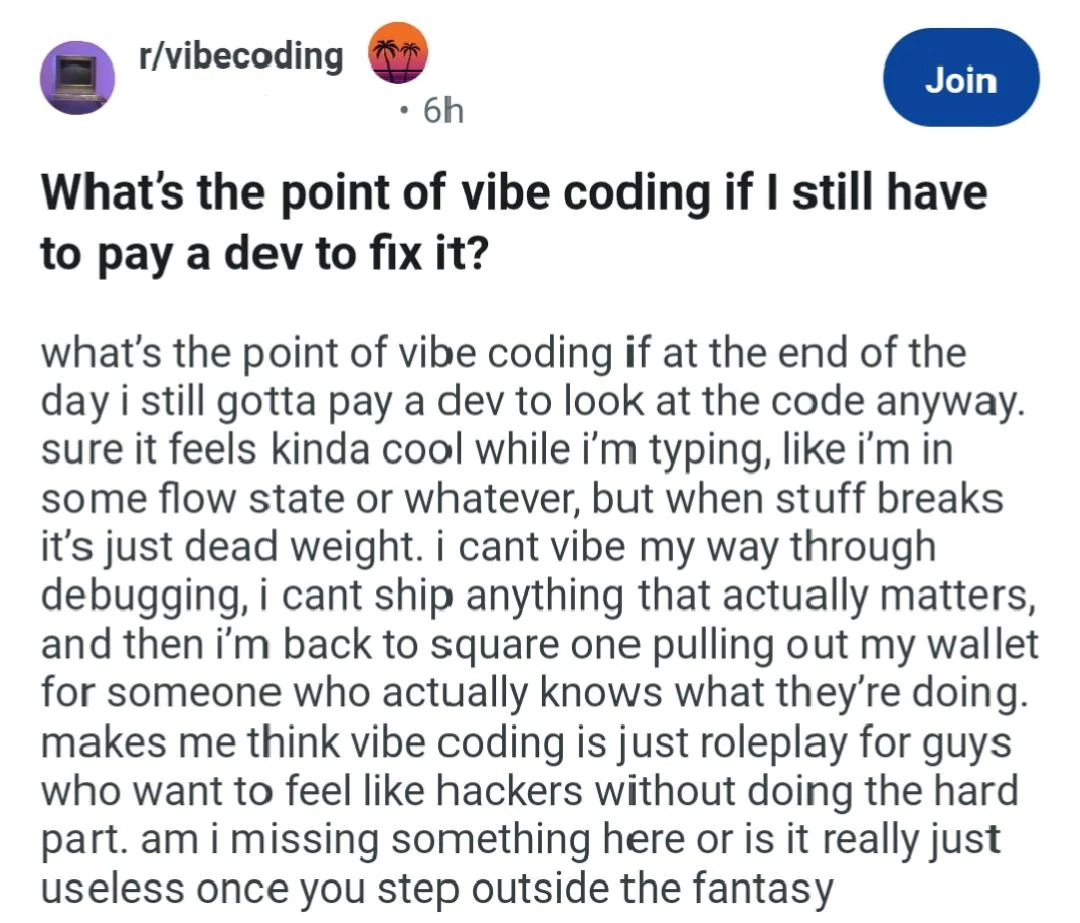this post was submitted on 19 Aug 2025
1502 points (99.5% liked)
Programmer Humor
25844 readers
2690 users here now
Welcome to Programmer Humor!
This is a place where you can post jokes, memes, humor, etc. related to programming!
For sharing awful code theres also Programming Horror.
Rules
- Keep content in english
- No advertisements
- Posts must be related to programming or programmer topics
founded 2 years ago
MODERATORS
you are viewing a single comment's thread
view the rest of the comments
view the rest of the comments

I don’t really care about vibe coders but as a dev with just under 2 decades in the field:
I can’t stress this enough: if you give me a PR with tons of new files and expect me to review it when you didn’t even review it yourself, I will 100% reject it and make you do it. If it’s all dumped into a single commit, I will whip your computer into the nearest body of water and tell you to go fish it out.
I don’t care what AI tool wrote your code. You’re still responsible for it and I will blame you.
I have never used an AI to code and don't care about being able to do it to the point that I have disabled the buttons that Microsoft crammed into VS Code.
That said, I do think a better use of AI might be to prepare PRs in logical and reasonable sizes for submission that have coherent contextualization and scope. That way when some dingbat vibe codes their way into a circle jerk that simultaneously crashes from dual memory access and doxxes the entire user base, finding issues is easier to spread out and easier to educate them on why vibe coding is boneheaded.
I developed for the VFX industry and I see the whole vibe coding thing as akin to storyboards or previs. Those are fast and (often) sloppy representations of the final production which can be used to quickly communicate a concept without massive investment. I see the similarities in this, a vibe code job is sloppy, sometimes incomprehensible, but the finished product could give someone who knew what the fuck they are doing a springboard to write it correctly. So do what the film industry does: keep your previs guys in the basement, feed them occasionally, and tell them to go home when the real work starts. (No shade to previs/SB artists, it is a real craft and vital for the film industry as a whole. I am being flippant about you for commedic effect. Love you guys.)
I think storyboards is a great example of how it could be used properly.
Storyboards are a great way for someone to communicate "this is how I want it to look" in a rough way. But, a storyboard will never show up in the final movie (except maybe fun clips during the credits or something). It's something that helps you on your way, but along the way 100% of it is replaced.
Similarly, the way I think of generative AI is that it's basically a really good props department.
In the past, if a props / graphics / FX department had to generate some text on a computer screen that looked like someone was Hacking the Planet they'd need to come up with something that looked completely realistic. But, it would either be something hand-crafted, or they'd just go grab some open-source file and spew it out on the screen. What generative AI does is that it digests vast amounts of data to be able to come up with something that looks realistic for the prompt it was given. For something like a hacking scene, an LLM can probably generate something that's actually much better than what the humans would make given the time and effort required. A hacking scene that a computer security professional would think is realistic is normally way beyond the required scope. But, an LLM can probably do one that is actually plausible for a computer security professional because of what that LLM has been trained on. But, it's still a prop. If there are any IP addresses or email addresses in the LLM-generated output they may or may not work. And, for a movie prop, it might actually be worse if they do work.
When you're asking an AI something like "What does a selection sort algorithm look like in Rust?", what you're really doing is asking "What does a realistic answer to that question look like?" You're basically asking for a prop.
Now, some props can be extremely realistic looking. Think of the cockpit of an airplane in a serious aviation drama. The props people will probably either build a very realistic cockpit, or maybe even buy one from a junkyard and fix it up. The prop will be realistic enough that even a pilot will look at it and say that it's correctly laid out and accurate. Similarly, if you ask an LLM to produce code for you, sometimes it will give you something that is realistic enough that it actually works.
Having said that, fundamentally, there's a difference between "What is the answer to this question?" and "What would a realistic answer to this question look like?" And that's the fundamental flaw of LLMs. Answering a question requires understanding the question. Simulating an answer just requires pattern matching.